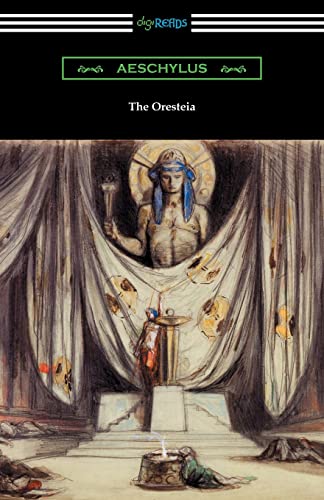The Oresteia (Agamemnon, The Libation Bearers, and The Eumenides)
Aeschylus
BOOK REVIEW

In a world where revenge dances with justice, The Oresteia grips you with a vice-like intensity that echoes through the labyrinth of human emotion. Crafted by the towering figure of Aeschylus, this ancient Greek trilogy-comprising Agamemnon, The Libation Bearers, and The Eumenides-is not merely a collection of plays; it's an existential odyssey that plunges into the depths of fate, guilt, and the struggle for moral order.
Agamemnon opens the curtain with a sense of foreboding that permeates the air. The titular king returns home from the Trojan War, but the blood of his past haunts him as mercilessly as the ghosts of the slain. His wife, Clytemnestra, is a force to be reckoned with, a woman hardened by betrayal and grief. The atmosphere thickens as she plots revenge-a tragic, seductive dance that reverberates through time. As you witness her act of vengeance unfold, you're swept into a cyclone of empathy and horror. Could you condemn her for her choices? Is her quest for retribution just, or merely a descent into madness? The gripping tension leaves you questioning the very fabric of justice itself.
Transitioning to The Libation Bearers, Aeschylus unveils the complexities of familial loyalty and revenge. Orestes, the son of Agamemnon, returns to avenge his father's murder. But what unfolds is not a straightforward tale of heroism. Instead, it's a tumultuous emotional landscape, as Orestes faces the insidious grip of duty and guilt. The weight of his actions presses down on him like the very stones of the altar where he must confront his mother's wrath. Will he find redemption, or will he be consumed by the blood that binds him to his lineage? The play captures the raw struggle between moral obligation and the innocent yearning for peace.
Finally, The Eumenides draws us into the realm of retribution and resolution. Here, Aeschylus contrasts ancient cycles of vengeance with the birth of justice. The Furies, embodiments of vengeance, clash with Athena, the goddess of wisdom, in a courtroom drama that transcends the boundaries of mere punishment. As the trials unfold, you're pushed to wrestle with the very notions of guilt, innocence, and the transformative power of societal order. The resolution offers a panoramic view of justice evolving from primal instincts into a structured society-the very foundation of modern governance.
Readers have traversed these plays and found themselves ensnared in a web of conflicting emotions. Some have lauded Aeschylus for his unflinching portrayal of human suffering, while others criticize the seemingly inexorable fate of his characters. The intense emotional dichotomy Aeschylus weaves pulls at the strings of your soul; you march through anguish and sorrow, yet emerge enlightened, questioning the nature of justice in all its complexity.
At its core, The Oresteia is a mirror reflecting our deepest fears and aspirations. Aeschylus, living amidst the dawn of democracy in ancient Athens, entwines his tragic narratives with the very fabric of oratory and civic duty. This trilogy not only shapes the Greek theatrical tradition but leaves an indelible mark on our cultural consciousness, inspiring countless playwrights and thinkers from Shakespeare to modern cinema. Have we not all witnessed our Orestes, navigating the murky waters of vengeance and justice in our own lives?
Dig deep into Aeschylus' world, and you will find yourself grappling with questions that haunt humanity-questions so potent that they reverberate across time. The Oresteia stands as a testament to the struggles of the human spirit, compelling us to confront our own moral dilemmas. This is not just a story; it's an evocative experience that challenges and transforms. 🌌✨️
📖 The Oresteia (Agamemnon, The Libation Bearers, and The Eumenides)
✍ by Aeschylus
🧾 150 pages
2015
#oresteia #agamemnon #libation #bearers #eumenides #aeschylus #Aeschylus